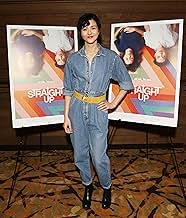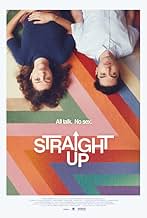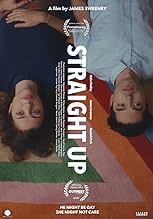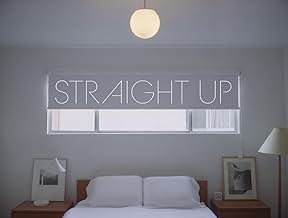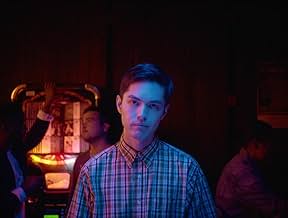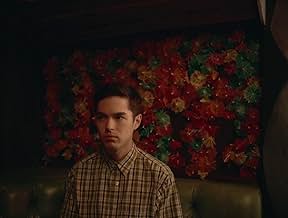ÉVALUATION IMDb
6,9/10
3,5 k
MA NOTE
Ajouter une intrigue dans votre langueTodd and Rory are intellectual soul mates. He might be gay. She might not care. A romantic-comedy drama with a twist; a love story without the thrill of copulation.Todd and Rory are intellectual soul mates. He might be gay. She might not care. A romantic-comedy drama with a twist; a love story without the thrill of copulation.Todd and Rory are intellectual soul mates. He might be gay. She might not care. A romantic-comedy drama with a twist; a love story without the thrill of copulation.
- Prix
- 1 victoire et 2 nominations au total
Joshua Diaz
- Zane
- (as Josh Diaz)
Jon E. Darby
- Student Director
- (as Jon Darby)
Avis en vedette
The main character is struggling with whether they're gay or not because they don't like gay sex. In fact they don't like sex at all. This is literally the definition of what being asexual is. This movie was written by people who have no idea there are sexualities beyond bi, gay or straight. It was frustrating to see potential representation of asexuality get shoved into the shadows.
I loved the writing in this movie. It's introspective and sharp, with back and forth repartee to totally engage you for its short 96 minute runtime. I have obsessive-compulsive thinking tendencies myself and I found the irreverent, self-referential dialogue and overall self-doubt both amusingly charming and relatable. The two main protagonists are given relatively equal screen time and sympathy and the audience finds themselves rooting for them as individuals and as a pair, even when their future is quite uncertain. The movie also poses tough and thoughtful questions about relationships that will keep you thinking about love and attraction and companionship long after the credits have rolled
If you're searching for an explanation of successful millennial romantic relationships, it might be characterized by bisexuality without sex. If you're searching for an unconventional romantic comedy? that's what writer/director/star James Sweeney offers in the brilliant Straight Up.
It's a rom-com whose roots are firmly placed in the Howard Hawke's world of His Girl Friday, where sex is a form of screwball comedy banter, brilliantly pop-cultured and offered by brainiac characters who want sex but accept words as more forgiving: "You called me." "No, I didn't." "Yes, you did." "My butt dialed you." "Well, I think your butt knows what your heart wants." You might also thin of the less biting, but still bright, Will & Grace.
Todd (Sweeney) and Rory (Katie Findlay) meet cute in a library and exchange super-charged dialogue titillating in its wit and emotionally fulfilling like good sex. He is OCD-his whole life is that analytical way-- arranging the books here making her think he's a librarian. He house sits rather than create a home. It's perhaps his OCD that keeps him from a satisfying sexuality, so preoccupied he is with deconstructing life that he misses its joys. He, however, knows he does not want to be alone his whole life.
The difference between Hawkes' dialogue or, say Wes Anderson's in The Grand Budapest Hotel, is that Straight Up relies on machinegunned words, whereas the earlier screwball comedies come out almost gently from sweet origins in the head with smoother delivery (Cary Grant and Rosalind Russell, for example).
Besides the smart dialogue, Straight Up offers, for the main characters' insistence otherwise, benign almost sexless love, which seems counterintuitive but ends up between the two principals an almost ideal state. Yet both characters long for love, a universal desire the lasts throughout the modern biracial and bisexual modes.
The comedy lampoons the correctness of our century while it offers a sober commentary on fulfilling relationships that rely on mind over matter.
Listen up you uncertain millennials, it's the mind that matters
It's a rom-com whose roots are firmly placed in the Howard Hawke's world of His Girl Friday, where sex is a form of screwball comedy banter, brilliantly pop-cultured and offered by brainiac characters who want sex but accept words as more forgiving: "You called me." "No, I didn't." "Yes, you did." "My butt dialed you." "Well, I think your butt knows what your heart wants." You might also thin of the less biting, but still bright, Will & Grace.
Todd (Sweeney) and Rory (Katie Findlay) meet cute in a library and exchange super-charged dialogue titillating in its wit and emotionally fulfilling like good sex. He is OCD-his whole life is that analytical way-- arranging the books here making her think he's a librarian. He house sits rather than create a home. It's perhaps his OCD that keeps him from a satisfying sexuality, so preoccupied he is with deconstructing life that he misses its joys. He, however, knows he does not want to be alone his whole life.
The difference between Hawkes' dialogue or, say Wes Anderson's in The Grand Budapest Hotel, is that Straight Up relies on machinegunned words, whereas the earlier screwball comedies come out almost gently from sweet origins in the head with smoother delivery (Cary Grant and Rosalind Russell, for example).
Besides the smart dialogue, Straight Up offers, for the main characters' insistence otherwise, benign almost sexless love, which seems counterintuitive but ends up between the two principals an almost ideal state. Yet both characters long for love, a universal desire the lasts throughout the modern biracial and bisexual modes.
The comedy lampoons the correctness of our century while it offers a sober commentary on fulfilling relationships that rely on mind over matter.
Listen up you uncertain millennials, it's the mind that matters
I just want to be friends with Todd and Rory. They are wacky and adorable and even borderline annoying and I love them both. This movie is the type of love story I can totally get attached to. And it's so funny that I need to watch it again, because there were times the audience was laughing so hard that I couldn't hear all the words. Just watch this movie any chance you get.
It's interesting to say the least, yet there's no real label to put on this film. It's not bad, it has a decent idea, fine execution, and it's quirky esque style suits the film perfectly. But sometimes a film just has that 'something feels slightly off' vibe that you can't put a finger on? Yea this film has that too.
Le saviez-vous
- AnecdotesAt one point, multiple distributors were interested in acquiring Straight Up, but none of them would accept the film in its intended aspect ratio of 4:3. James Sweeney was instructed to deliver in 16:9, excise 25 percent of the frame. He refused to give up his creative vision and eventually found a distributor who agreed.
- GaffesAlthough not impossible, the opening conversation between the Todd and Rory (not a give-away because it is literally the opening of the movie) develops from Rory saying Todd might generally be mistaken for an employee based on his putting things (for instance organizing books) in order.
Todd replied that no, someone mistook him for a Staples employee, asking where the paperweights are, and he wasn't doing anything, just standing there.
Perhaps it is a dig at Staples employees who just stand there, or a play on the fact that he was not doing anything and was asked about paperweights. Yes, there are decorative desk things they sell as 'paperweights' at Staples, but nobody ever went to Staples to buy a paperweight. Inventing some scenario that didn't happen or joking is out of character.
- Citations
Dr. Larson: Are you sure you're a boy?
Todd: [pause] Well, I was until now.
- ConnexionsReferences Le fidèle vagabond (1957)
- Bandes originalesScoobidoo Love
Written by Paul Rothman
Meilleurs choix
Connectez-vous pour évaluer et surveiller les recommandations personnalisées
- How long is Straight Up?Propulsé par Alexa
Détails
Box-office
- Brut – États-Unis et Canada
- 16 080 $ US
- Fin de semaine d'ouverture – États-Unis et Canada
- 4 075 $ US
- 1 mars 2020
- Brut – à l'échelle mondiale
- 16 080 $ US
- Durée1 heure 35 minutes
- Couleur
- Rapport de forme
- 1.33 : 1
Contribuer à cette page
Suggérer une modification ou ajouter du contenu manquant



